like to do与like doing的区别
like和like to的区别和用法(精选1篇)
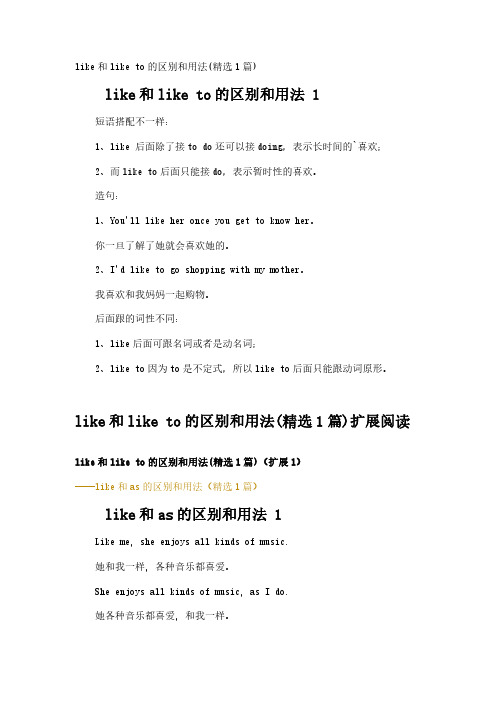
like和like to的区别和用法(精选1篇)like和like to的区别和用法1短语搭配不一样:1、like后面除了接to do还可以接doing,表示长时间的`喜欢;2、而like to后面只能接do,表示暂时性的喜欢。
造句:1、You'll like her once you get to know her。
你一旦了解了她就会喜欢她的。
2、I'd like to go shopping with my mother。
我喜欢和我妈妈一起购物。
后面跟的词性不同:1、like后面可跟名词或者是动名词;2、like to因为to是不定式,所以like to后面只能跟动词原形。
like和like to的区别和用法(精选1篇)扩展阅读like和like to的区别和用法(精选1篇)(扩展1)——like和as的区别和用法(精选1篇)like和as的区别和用法1Like me,she enjoys all kinds of music.她和我一样,各种音乐都喜爱。
She enjoys all kinds of music,as I do.她各种音乐都喜爱,和我一样。
He worked as a slave.他是**。
He worked like a slave.他像**一样工作。
like和like to的区别和用法(精选1篇)(扩展2)——like和liketo的区别和用法(一)份like和liketo的区别和用法1You'll like her once you get to know her。
你一旦了解了她就会喜欢她的'。
I'd like to go shopping with my mother。
我喜欢和我妈妈一起购物。
You'll like her once you get to know her.你一旦了解了她就会喜欢她的。
I didn't like the job much at first.起初我并不很喜欢这个工作。
todo与doing的区别
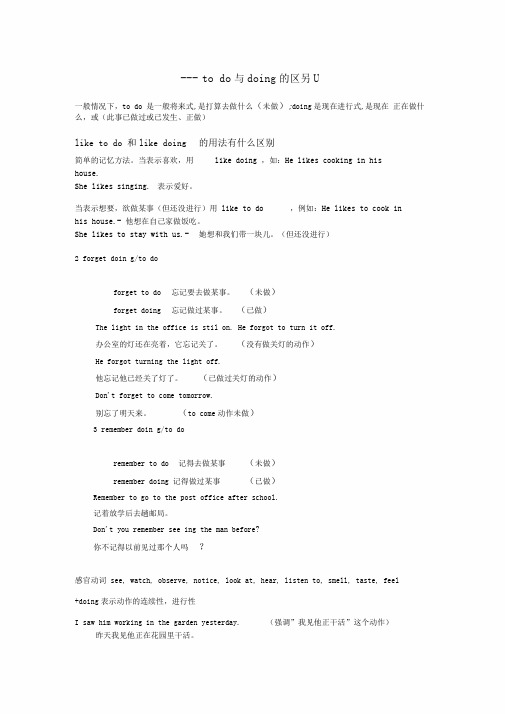
--- to do与doing的区另U一般情况下,to do 是一般将来式,是打算去做什么(未做);doing是现在进行式,是现在正在做什么,或(此事已做过或已发生、正做)like to do 和like doing 的用法有什么区别简单的记忆方法。
当表示喜欢,用like doing ,如:He likes cooking in hishouse.She likes singing. 表示爱好。
当表示想要,欲做某事(但还没进行)用like to do ,例如:He likes to cook inhis house.- 他想在自己家做饭吃。
She likes to stay with us.- 她想和我们带一块儿。
(但还没进行)2 forget doin g/to doforget to do 忘记要去做某事。
(未做)forget doing 忘记做过某事。
(已做)The light in the office is stil on. He forgot to turn it off.办公室的灯还在亮着,它忘记关了。
(没有做关灯的动作)He forgot turning the light off.他忘记他已经关了灯了。
(已做过关灯的动作)Don't forget to come tomorrow.别忘了明天来。
(to come动作未做)3 remember doin g/to doremember to do 记得去做某事(未做)remember doing 记得做过某事(已做)Remember to go to the post office after school.记着放学后去趟邮局。
Don't you remember see ing the man before?你不记得以前见过那个人吗?感官动词 see, watch, observe, notice, look at, hear, listen to, smell, taste, feel+doing表示动作的连续性,进行性I saw him working in the garden yesterday. (强调”我见他正干活”这个动作)昨天我见他正在花园里干活。
小学英语精讲精析 I like swimming

Module 1 Unit 2 I like swimming.1.掌握句型like doing sth, “喜欢做什么”并且掌握like doing sth. 和like to do sth. 区别like to do sth 是偶尔一次的爱好,而like doing sth 是长期性的爱好.like+doing这里面的进行时表示喜欢经常做一件事情,这件事情也就是这个人的爱好,例如"Do you like reading?"意思是你爱好读书吗?like+to do加不定式表示想做什么事情,意思类似于want,例如"Do you like to go with me?"表示现在愿不愿意去做某事like一词具有多种词性和词义,以及多种用法。
现简述如下:(1)用作动词:①like+名词/代词,意为"喜欢某人或某物"。
例如:Tom likes fish very much.汤姆非常喜欢鱼。
Mr Wang is a good teacher.We all like him. 王老师是个好老师,我们都喜欢他。
②like to do sth. 意为"(偶尔或具体地)喜欢做某事"。
例如:I like to swim with you today.今天我喜欢和你一起去游泳。
③like doing sth. 意为"(经常或习惯地)喜欢做某事"。
例如:He likes singing.他喜欢唱歌。
④like sb. to do sth.意为"喜欢某人做某事"。
例如:She likes them to ask questions like this. 她喜欢他们像这样问问题。
⑤would like to do sth. (=want to do sth.)意为" 想要做某事"。
例如:I'd like to go shopping with you.我想要和你一起去买东西。
初一英语译林版7AUnit6foodandlifestyle同步基础知识梳理(上)+可数名词和不可数

学科教师辅导讲义教学内容批注:以上两幅图幽默的反映了当前我们所面临的食品安全问题,通过对这两个问题的分析和讨论自然过度到本单 元所要讲的重点内容一一生活方式与健康问题。
任课老师可以根据学生的实际水平灵活的对这两个图片进行展开和 补充,目的在于激发学生学习的积极性和主动性,为接下来的学习做铺垫,使学习更加生动有趣。
一、课文回顾1. An apple a day keeps the doctor away!这句话的本来形式是 :Eating an apple a day keeps the doctor away.⑴keep …awa 或 keep away from 意为。
eg: Don't touch the machine.It's dangerous. You'd better keep away from it.别碰那台机械,很危险。
你最好远离它。
(2)keep 后常跟 doing ,即,意思是;⑶keep 还可以作系动词,后跟 ,如 keep quiet/ healthy 等。
答案:⑴keep …awa 或 keep away from 意为 远离 ............ ”。
(2)keep 后常跟doing,即keep doing,意思是“一直做某事”; (3)keep 还可以作系动词,后跟形容词,如 keep quiet/ healthy 等。
学员编号: 学员姓名: 年 级 辅导科目:课时数:3 学科教师:授课类型 T 7A Unit6 知识梳理(上) C 可数名词和不可数名词授课日期及时段XX : X X ——X X : X X2.For lunch and dinner, I usually eat fish and vegetables.中饭和晚饭我通常吃鱼和蔬菜。
(1)vegetable 是, 意为。
eg: Can you buy some vegetables today?今天你能买——些蔬菜吗?Is a tomato a vegetable or fruit? 西红柿是蔬菜还是水果?(2)vegetable还可用作定语修饰。
英语学习中的六种基本句型结构

英语学习中的六种基本句型结构句型1:Subject (主语) +Verb (谓语动词)这种句型中的动词大多是不及物动词,常见的动词如:work, sing, swim, fish, jump, arrive, come, die, disappear, cry, happen等。
如:1) Li Ming works very hard.李明学习很努力。
2) The little girl cried even harder. 小女孩哭得更厉害了。
3) The accident happened yesterday afternoon.事故是昨天下午发生的。
句型2:Subject (主语) +Link. V(系动词) +Predicate(表语)复合谓语这种句型主要用来表示主语的特点、身份等。
其系动词一般可分为下列两类:(1)表示状态。
这样的词有:be, remain, look, seem, smell, taste, sound, keep, feel等。
如:1) This kind of food tastes delicious.这种食物吃起来很可口。
2) He looked worried just now.刚才他看上去有些焦急。
(2)表示变化。
这类系动词有:become, turn, get, grow, go等。
如:1) Spring comes. It is getting warmer and warmer.春天到了,天气变得越来越暖和。
2) The tree has grown much taller than before.这棵树比以前长得高多了。
三、句型3:Subject(主语) +V erb (谓语动词) +Object (宾语)这种句型中的动词一般为及物动词。
其宾语通常由名词、代词、动词不定式、动名词或从句等来充当。
例:1) He took his bag and left.(名词)他拿着书包离开了。
to-do与doing的区别

to do与doing的区别一般情况下,to do是一般将来式,是打算去做什么(未做);doing是现在进行式,是现在正在做什么,或(此事已做过或已发生、正做)like to do 和like doing 的用法有什么区别简单的记忆方法。
当表示喜欢,用like doing ,如:He likes cooking in his house. She likes singing. 表示爱好。
当表示想要,欲做某事(但还没进行)用like to do ,例如:He likes to cook in his house.-他想在自己家做饭吃。
She likes to stay with us.- 她想和我们带一块儿。
(但还没进行)2 forget doin g/to doforget to do 忘记要去做某事。
(未做)forget doing 忘记做过某事。
(已做)The light in the office is stil on. He forgot to turn it off.办公室的灯还在亮着,它忘记关了。
(没有做关灯的动作)He forgot turning the light off.他忘记他已经关了灯了。
(已做过关灯的动作)Don't forget to come tomorrow.别忘了明天来。
(to come 动作未做)3 remember doin g/to doremember doing 记得做过某事(已做)Remember to go to the post office after school.记着放学后去趟邮局。
Don't you remember see ing the man before?你不记得以前见过那个人吗?感官动词 see, watch, observe, notice, look at, hear, listen to, smell, taste, feel +doi ng 表示动作的连续性,进行性I saw him working in the garden yesterday. (强调”我见他正干活"这个动作)昨天我见他正在花园里干活。
六年级英语下册第三单元知识点和课文翻译
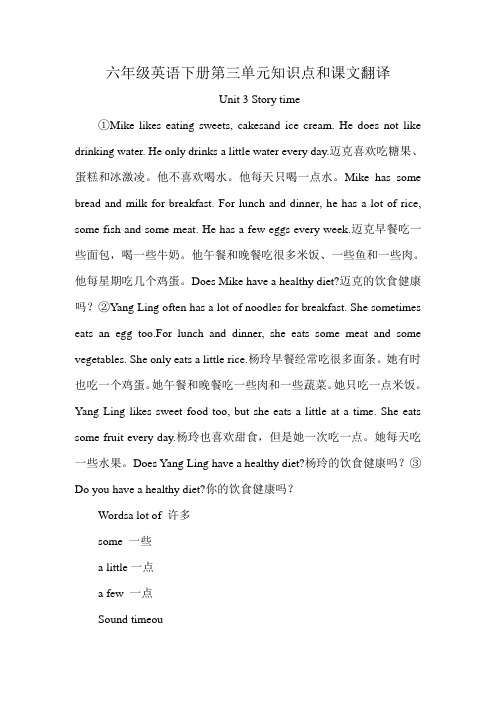
六年级英语下册第三单元知识点和课文翻译Unit 3 Story time①Mike likes eating sweets, cakesand ice cream. He does not like drinking water. He only drinks a little water every day.迈克喜欢吃糖果、蛋糕和冰激凌。
他不喜欢喝水。
他每天只喝一点水。
Mike has some bread and milk for breakfast. For lunch and dinner, he has a lot of rice, some fish and some meat. He has a few eggs every week.迈克早餐吃一些面包,喝一些牛奶。
他午餐和晚餐吃很多米饭、一些鱼和一些肉。
他每星期吃几个鸡蛋。
Does Mike have a healthy diet?迈克的饮食健康吗?②Yang Ling often has a lot of noodles for breakfast. She sometimes eats an egg too.For lunch and dinner, she eats some meat and some vegetables. She only eats a little rice.杨玲早餐经常吃很多面条。
她有时也吃一个鸡蛋。
她午餐和晚餐吃一些肉和一些蔬菜。
她只吃一点米饭。
Yang Ling likes sweet food too, but she eats a little at a time. She eats some fruit every day.杨玲也喜欢甜食,但是她一次吃一点。
她每天吃一些水果。
Does Yang Ling have a healthy diet?杨玲的饮食健康吗?③Do you have a healthy diet?你的饮食健康吗?Wordsa lot of 许多some 一些a little 一点a few 一点Sound timeouabout 大约house 房子mouth 嘴巴out 出去shout 喊,叫Mrs Li shouts, 李太太大声喊,“Get out! Get out!”滚!滚!There’s a little mouse 有一只小老鼠。
Like作动词主要用于下列结构

Like作动词主要用于下列结构:(1)like+sb./sth.意为“喜欢某人/某物”Do you like rice/hot dog/vegetables?你喜欢米饭/ 热狗/蔬菜吗?Yes,I do./No, I don’ t.是的,我喜欢。
/不,我不喜欢。
The teacher likes his students.老师喜欢他的学生。
(2)like to do(sth)意为“喜欢做(某事)”。
They like to eat different kinds of food.他们喜欢吃不同种类的食品。
She likes to go swimming this afternoon.今天下午,她想去游泳。
(3)like doing (sth.)意为“喜欢做(某事)”。
I like watching TV我喜欢看电视。
She likes reading.她喜欢阅读。
(4)like sb.to do (sth)意为“想要某人做(某事)”,该句型中sb-作宾语,不定式to do(sth.)作宾语补足语。
Mother likes me to get up early.妈妈想让我早起。
(5)like to do和like doing:两个短语无大区别,可以互换使用。
但like doing泛指“喜欢做某事";like to do特指“喜欢做某事”,着重指具体行为。
I like playing football,but I like to play basketball today.我喜欢踢足球,但今天我想打篮球。
(6)like作介词,意为“像”,在句中一般作状语或表语。
Uncle Wang makes a machine like a bike and a plane.王叔叔制作了一个既像自行车又像飞机的机器。
Don’t do it like that.别像那样做。
What is he like?与What does he look like?的区另U答:What does sb. look like?用于提问人的长相、外貌,意为“他长得什么样?”“What's sb. like? ”用于提问人的性格、品质等,意为“他是个什么样的人?”。
liketodo与likedoing的区别
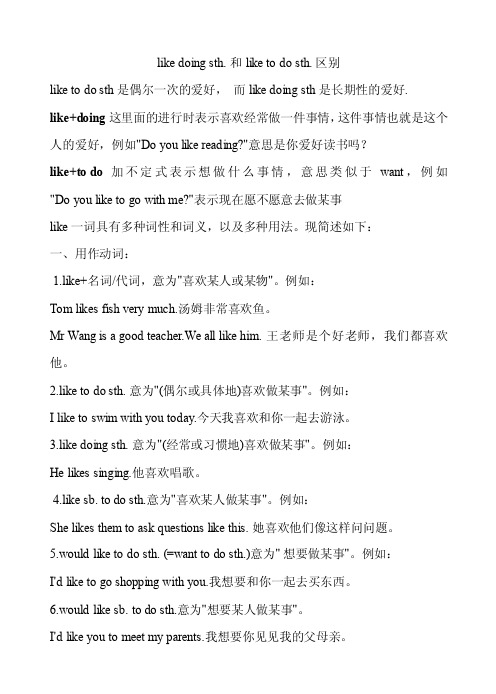
like doing sth. 和 like to do sth. 区别like to do sth 是偶尔一次的爱好,而like doing sth 是长期性的爱好.like+doing这里面的进行时表示喜欢经常做一件事情,这件事情也就是这个人的爱好,例如"Do you like reading?"意思是你爱好读书吗?like+to do加不定式表示想做什么事情,意思类似于want,例如"Do you like to go with me?"表示现在愿不愿意去做某事like一词具有多种词性和词义,以及多种用法。
现简述如下:一、用作动词:1.like+名词/代词,意为"喜欢某人或某物"。
例如:Tom likes fish very much.汤姆非常喜欢鱼。
Mr Wang is a good teacher.We all like him. 王老师是个好老师,我们都喜欢他。
2.like to do sth. 意为"(偶尔或具体地)喜欢做某事"。
例如:I like to swim with you today.今天我喜欢和你一起去游泳。
3.like doing sth. 意为"(经常或习惯地)喜欢做某事"。
例如:He likes singing.他喜欢唱歌。
4.like sb. to do sth.意为"喜欢某人做某事"。
例如:She likes them to ask questions like this. 她喜欢他们像这样问问题。
5.would like to do sth. (=want to do sth.)意为" 想要做某事"。
例如:I'd like to go shopping with you.我想要和你一起去买东西。
6.would like sb. to do sth.意为"想要某人做某事"。
英语词法笔记
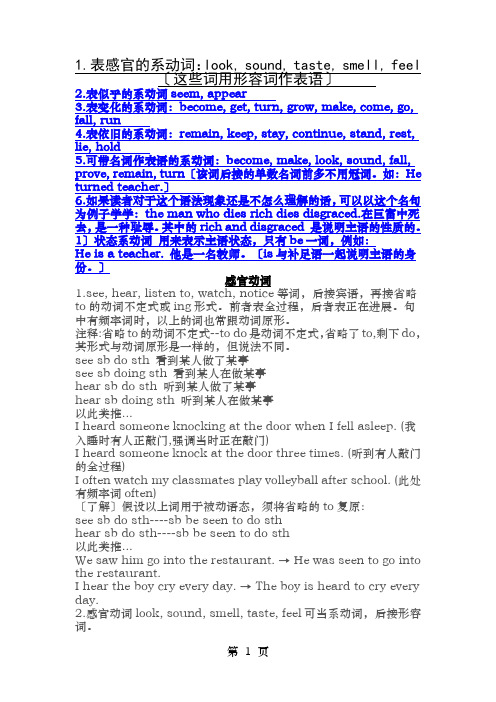
1.表感官的系动词:look, sound, taste, smell, feel〔这些词用形容词作表语〕2.表似乎的系动词seem, appear3.表变化的系动词:become, get, turn, grow, make, come, go, fall, run4.表依旧的系动词:remain, keep, stay, continue, stand, rest, lie, hold5.可带名词作表语的系动词:become, make, look, sound, fall, prove, remain, turn〔该词后接的单数名词前多不用冠词。
如:He turned teacher.〕6.如果读者对于这个语法现象还是不怎么理解的话,可以以这个名句为例子学学:the man who dies rich dies disgraced.在巨富中死去,是一种耻辱。
其中的rich and disgraced 是说明主语的性质的。
1〕状态系动词用来表示主语状态,只有be一词,例如:He is a teacher. 他是一名教师。
〔is与补足语一起说明主语的身份。
〕感官动词1.see, hear, listen to, watch, notice等词,后接宾语,再接省略to的动词不定式或ing形式。
前者表全过程,后者表正在进展。
句中有频率词时,以上的词也常跟动词原形。
注释:省略to的动词不定式--to do是动词不定式,省略了to,剩下do,其形式与动词原形是一样的,但说法不同。
see sb do sth 看到某人做了某事see sb doing sth 看到某人在做某事hear sb do sth 听到某人做了某事hear sb doing sth 听到某人在做某事以此类推...I heard someone knocking at the door when I fell asleep. (我入睡时有人正敲门,强调当时正在敲门)I heard someone knock at the door three times. (听到有人敲门的全过程)I often watch my classmates play volleyball after school. (此处有频率词often)〔了解〕假设以上词用于被动语态,须将省略的to复原:see sb do sth----sb be seen to do sthhear sb do sth----sb be seen to do sth以此类推...We saw him go into the restaurant. → He was seen to go into the restaurant.I hear the boy cry every day. → The boy is heard to cry every day.2.感官动词look, sound, smell, taste, feel可当系动词,后接形容词。
like的用法及特点
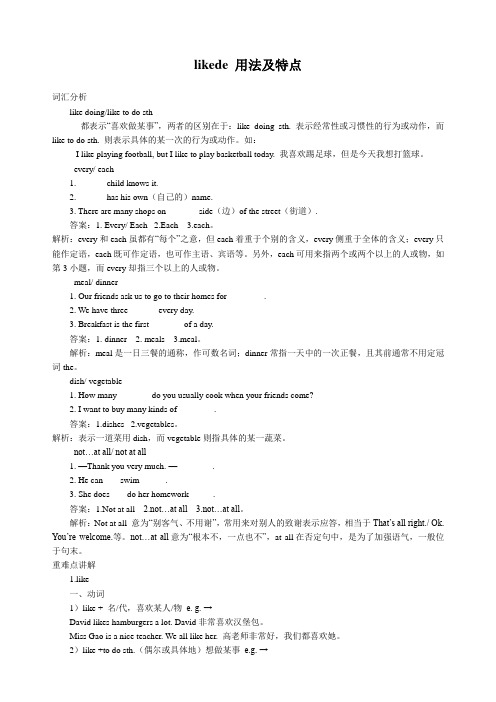
likede 用法及特点词汇分析like doing/like to do sth都表示“喜欢做某事”,两者的区别在于:like doing sth. 表示经常性或习惯性的行为或动作,而like to do sth. 则表示具体的某一次的行为或动作。
如:I like playing football, but I like to play basketball today. 我喜欢踢足球,但是今天我想打篮球。
every/ each1. ______ child knows it.2. ______ has his own(自己的)name.3. There are many shops on_______ side(边)of the street(街道).答案:1. Every/ Each 2.Each 3.each。
解析:every和each虽都有“每个”之意,但each着重于个别的含义,every侧重于全体的含义;every只能作定语,each既可作定语,也可作主语、宾语等。
另外,each可用来指两个或两个以上的人或物,如第3小题,而every却指三个以上的人或物。
meal/ dinner1. Our friends ask us to go to their homes for ________.2. We have three ______ every day.3. Breakfast is the first _______ of a day.答案:1. dinner 2. meals 3.meal。
解析:meal是一日三餐的通称,作可数名词;dinner常指一天中的一次正餐,且其前通常不用定冠词the。
dish/ vegetable1. How many _______ do you usually cook when your friends come?2. I want to buy many kinds of ________.答案:1.dishes 2.vegetables。
深圳优质课件 小学英语深港版五年级like doing和like to do

Peppa likes __p_a_in_t_in__g_. We like to _p_l_a_y_ computer games. He likes __to__ri_d_e_a bike this afternoon.
like doing 的否定句
第一人称和第二人称主语的否定句用don’t,
Read and circle.
1. Peppa likes / doesn’t like shopping. 2. Peppa likes to playing / play chess. 3. Peppa's sister likes / likes to listening to music. 4. Peppa's sister doesn’t / don’t like to fish. 5. What do Peppa and her sister like do / to do?
1)like +doing →like加动名词(动词的ing形式)
表示兴趣、爱好或持续喜欢做的事情。
Eg: Peppa likes flying a kite.
2)like +to do→ like加动词不定式(to do)
表示(偶尔)喜欢做某事, 有时在句尾接表示时间段的词或短语。
Eg: Peppa likes to fly a kite this afternoon.
12
Hello. I am Peppa. I have lots of hobbies. I like playing chess and painting.I don't like shopping but my sister does. My sister likes listening to music,too.She doesn't like fishing but I do. I like to play chess this afternoon.My sister likes to play chess with me.It's going to be lots of fun.
like的用法

小学英语like作为动词的用法总结
临淄区康平小学 陶磊
Meaning of "like" like 用作动词,意思为“爱,爱好,喜欢” , 既表示对“人或者事物的真挚的感情”, 又表示“对某事有着浓厚的兴趣、爱好”。
那么,like 的常见用法有哪些呢?
how to use "like"
用法一:like +名词/代词,意为“喜欢某人或某物” I like apples. They are dilicious.
Our English teacher is nice.We like her.
how to use "like" 用法2:like +doing something,意为 “(经常或习惯地)喜欢做某事
Thank you~~
临淄区康平小学 陶磊
sum-up
用法一:like +名词/代词, 意为“喜欢某人或某物”
用法2:like +doing something, 意为“(经常或习惯地)喜欢做某事
用法3:like +to do something, 意为(偶尔或具体地)喜欢做某事
Let's have a try~
I _l_ik_e____(like)Xiao Hong.
She is a beautiful girl,she __li_ke_s_p_l_ay_i_ng__(like play)basketball very much.But,she_li_k_es__to__p_la_y_(like play) football with me today.We have a good time .
译林小学英语5A 第四单元知识点与对应练习

词汇、词组、句型复习1.词汇关(一)根据中文意思写出下列单词。
1. 擅长____________2. 读,阅读_____________3. 故事____________4. 跳舞_________5. 唱歌_________6. 看电影__________7.与……一起___________ 8. 弹钢琴_________(二)英汉互译。
1.篮球打得好___________________2.talk about their hobbies_______________3.踢足球_______________________4.have an idea_______________________5.擅长于跳舞______________________6.cold and wet_______________________7.喜欢画画____________________8.skate on the ice_______________9.今天下午_____________________ 10. play the piano_____________________ 11.读故事______________________ 12. in winter_________________________ 13.喜欢跳舞___________________ 14.watch films_______________________2.句型关1.我喜欢打篮球和踢足球。
I like_______ ________and _______ _______.2.我篮球能打的很好,但是不擅长足球。
I can play basketball ______,but I am not ______ _____ at football.3.他擅长足球。
______________________4.他擅长打篮球。
to do sth 和doing sth 的区别

like to do sth 和 like doing sth的区别用法讲解,非常详细:like doing和like to do都表示"喜欢做某事",但是1,like doing sth表示长时间的喜欢做某事,指兴趣爱好。
在意义上比较一般和抽象,时间观念不强,不指某一次动作;例:I like watching TV . 我喜欢看电视。
Do you like singing ? 你喜欢唱歌吗?She likes swimming.她喜欢游泳。
(经常性的,爱好)I like eating fish .(我喜欢吃鱼,个人口味而已,一种爱好,喜欢)2,like to do sth 则常指某个具体的动作,表示偶尔一次喜欢做某事、或者突然喜欢干某事。
like to do sth 想去做某事(表示有个趋向性,好像是要到某处去做某事)如:She likes to swim this afternoon.她今天下午想游泳。
(特指某一次的动作)另外,在搭配(使用方法)上,“ like to do ”一般与“ would ”搭配表示意愿。
例:I would like to swim with you . 我愿意和你去游泳。
Would you like to skate ? 你愿意去滑冰吗?一般情况下,不定式作定语,意思含有将来,过去分词作定语,与主语的关系为被动,现在分词作定语,与主语的关系为主动。
playing beach volleyball是现在分词作定语修饰名词 a group of people现在分词不是谓语动词,而是非谓语动词,所以没有时态。
只有谓语动词才有时态。
但现在分词表示动作的时间:正在进行的动作。
句子的意思是:看那些正在玩排球的人们。
另外,可以作定语的非谓语动词还有:过去分词(表示动作已经完成),不定式(表示动作将要进行)动词的过去式和过去分词(规则)1.一般在词尾加“-ed”help-helped-helped 帮助look-looked-looked 看plant-planted-planted 种植work-worked-worked 工作2.以不发音e结尾的词加“-d”live-lived-lived 居住hope-hoped-hoped 希望change-changed-changed 变化3.名词以“元音字母+y”结尾时,加“-d”;以“辅音字母+y”结尾时,变 y为i,再加“-ed”play-played-played 玩stay-stayed-stayed 逗留study-studied-studied 学习carry-carried-carried 运送过去分词作定语过去分词可以作名词的前置定语frozen food 冷冻食品fallen leaves 落叶<><><>过去分词短语可以作名词的后置定语The fish caught yesterday is still alive.昨天捉来的鱼还活着。
人教版七下Unit 1 单元重要词汇,短语及知识点汇总

Unit 1 Can you play the guitar?(人教版七下单元重要词汇,短语及知识点汇总)一.单元词汇汇总:guitar n.吉他sing v.唱歌swim v. & n.游泳dance v.跳舞n.舞蹈draw v.画chess n.国际象棋speak v.说,说话join v.参加,加入club n.俱乐部,社团tell v.讲述,告诉story n.故事,小说write v.写作,写字show v.展示,给……看n.演出,节目or conj.或者,也不talk v. & n.说话,交谈drum n.鼓piano n.钢琴violin n.小提琴also adv.也,而且people n.人,人们home n.家,活动本部adv.到家,在家make v.使成为,制造today adv.在今天center n.中央,中心weekend n.周末teach v.教,讲授musician n.音乐家play chess下国际象棋speak English说英语be good at…擅长于……talk to…跟……说kung fu(中国)功夫play the piano弹钢琴be good with…善于应付……的,对……有办法play the drums敲鼓play the violin拉小提琴make friends结交朋友help sb. with sth. 在某方面帮助某人on the weekend在周末do kung fu做中国功夫tell stories讲故事二.单元重要语法:情态动词can1.用法:在形式上没有人称和数的变化,不能单独做谓语,后跟动词原形。
(1)表示能力(can表示现在的能力,could表示过去的能力);e.g. We can speak a little English.Her sister can play the violin.Her sister could speak French.(2)表示许可;e.g. You can play basketball on weekends.You can’t run in the hallways.(3)表示请求(could也可以表示请求,但语气比can更委婉);e.g. Can you help me with my Chinese.Could you tell him to call me back.(4)表示可能性(can表示“理论上的可能性”,could, may表示实际上的可能性)。
- 1、下载文档前请自行甄别文档内容的完整性,平台不提供额外的编辑、内容补充、找答案等附加服务。
- 2、"仅部分预览"的文档,不可在线预览部分如存在完整性等问题,可反馈申请退款(可完整预览的文档不适用该条件!)。
- 3、如文档侵犯您的权益,请联系客服反馈,我们会尽快为您处理(人工客服工作时间:9:00-18:30)。
like doing sth. 和 like to do sth. 区别
like to do sth 是偶尔一次的爱好,而like doing sth 是长期性的爱好.
like+doing这里面的进行时表示喜欢经常做一件事情,这件事情也就是这个人的爱好,例如"Do you like reading?"意思是你爱好读书吗?
like+to do加不定式表示想做什么事情,意思类似于want,例如"Do you like to go with me?"表示现在愿不愿意去做某事
like一词具有多种词性和词义,以及多种用法。
现简述如下:
一、用作动词:
1.like+名词/代词,意为"喜欢某人或某物"。
例如:
Tom likes fish very much.汤姆非常喜欢鱼。
Mr Wang is a good teacher.We all like him. 王老师是个好老师,我们都喜欢他。
2.like to do sth. 意为"(偶尔或具体地)喜欢做某事"。
例如:
I like to swim with you today.今天我喜欢和你一起去游泳。
3.like doing sth. 意为"(经常或习惯地)喜欢做某事"。
例如:
He likes singing.他喜欢唱歌。
4.like sb. to do sth.意为"喜欢某人做某事"。
例如:
She likes them to ask questions like this. 她喜欢他们像这样问问题。
5.would like to do sth. (=want to do sth.)意为" 想要做某事"。
例如:
I'd like to go shopping with you.我想要和你一起去买东西。
6.would like sb. to do sth.意为"想要某人做某事"。
I'd like you to meet my parents.我想要你见见我的父母亲。
二、用作介词:
1. be like, look like后接名词或代词作宾语,意为"像……;跟……一样"。
例如: What is he like? 他是怎么样的一个人?
The little girl looks like her father.那个小姑娘看起来像她的父亲。
2. feel like后接V?鄄ing形式、代词或名词,意为"想要做某事"。
例如:Do you feel like having a rest? 你想休息吗?
We'll go for a walk if you feel like it.如果你想散步,我们就去吧。
三、常见句型:
1. What do you like about...?意为"关于……你喜欢什么?",用来询问对方所喜欢的内容。
例如:
-What do you like about China? 你喜欢中国的什么?
-The food and the people.食物和人民。
2. How do you like...?意为"你认为……怎么样?"(=What do you think of...?)例如:
-How do you like the film? 你认为这部电影怎么样?
-It's very interesting.很有趣。
3. Would you like +名词/ to do sth.?意为"你想要……吗?",用来询问对方是否需要什么或征求意见与看法。
例如:
Would you like some water? 你想要一些水吗?
Would you like to play football with us? 你愿意和我们一起去踢足球吗?。
